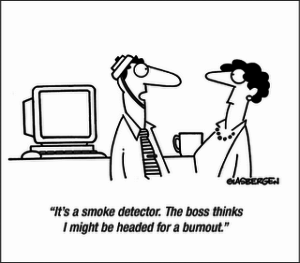Extinguishing Burnout

Employees feel they are expected to “go above and beyond the call of duty.” They feel compelled to work longer hours than needed. They feel they’ll get reprimanded if they aren’t always logged on—even on nights and weekends.
The fear of employee burnout can rattle many work environments. With the unpredictable economy, it’s become imperative for companies to strive to keep their employees highly engaged. But, as the New York Times tell us, most employees feel engagement has become synonymous with the forced expectation for them to “go the extra mile.” As a result, the possibility of burnout is more imminent than it’s ever been.
What is Burnout?
What exactly is burnout? Most people think stress and burnout are the same thing. You might have thought “I’m crazy stressed out at work! I must be burnt out!” Actually, it’s the opposite.
When you’re feeling a high amount of stress it’s usually because something is too much: Too many pressures, too much demand on you physically and emotionally.
Burnout on the other hand is a result of not enough: Feeling empty, unmotivated, undervalued and basically beyond caring.
Burnout Risk in Today’s Workplace
Employees feel they are expected to “go above and beyond the call of duty.” They feel compelled to work longer hours than needed. They feel they’ll get reprimanded if they aren’t always logged on—even on nights and weekends. This “always on” routine will ultimately lead once enthusiastic employees to feel nothing but apathy.
Stress is something many of us deal with on a daily basis. Whether it’s in the workplace or at home—it’s inevitable. It causes us to feel hyperactive, over reactive and anxious.
When you are experiencing the characteristics of burnout, those indicators show up as disengaged, hopeless and detached: A complete lack of passion and motivation. Here is a handy chart to show some other differences:
| STRESS VS BURNOUT | |
| Stress | Burnout |
| Characterized by over engagement | Characterized by disengagement |
| Emotions are over reactive | Emotions are blunted |
| Produces urgency and hyperactivity | Produces helplessness and hopelessness |
| Loss of energy | Loss of motivation, ideals, and hope |
| Leads to anxiety disorders | Leads to detachment and depression |
| Primary damage is physical | Primary damage is emotional |
How to Avoid Burnout
How can you avoid the feeling of wanting to strap a smoke detector to your head? Here are some ideas for combating burnout:
Understand what makes you tick: The “S” in our PRES model represents self-knowing and this is hugely important when it comes to avoiding burnout. If you’re someone who is usually energetic, creative and quick-witted, and you start to notice a melting sensation in your brain, perhaps it’s time to do a temperature check. By understanding how you function and thrive as a professional, you’ll create greater awareness of when your personality and motivation start to shift.
Find projects that can help you re-energize: A project where you feel more productive or gets your creative juices flowing can help you feel like an important member of the team.
Connect with someone you trust: Individuals should have the courage to approach their manager or mentor and open up about their challenges at work, especially if they feel lost. A good manager or mentor will listen and offer solutions or suggestions to help ease the difficulties.
Remember—it’s a two-way street: Individuals need to speak up when they feel like they’re drowning. And managers need to create an open door of communication and trust. This can lead to easier professional balance and better completion of projects.
Managers: How You Can Help Your Team
I’m not letting you off the hook so easily managers! One of the indicators of burnout is not feeling valued. If managers provide specific, timely praise—allowing the employee to feel valued—it may help to shift the tide. Spontaneous praise can go a long way to make employees feel engaged.
You should also take a note from your direct reports. According to a Towers Watson survey, leaders who demonstrate a healthy work life balance and take a sincere interest in their employees’ emotional welfare, tend to lead more financially successful organizations. “Wait a second Drew, are you saying that if I don’t work nights and weekends consistently, AND allow myself and my team to take that summer vacation my company will make more money?”
Yes person I just made up in my head, that’s exactly what I’m saying.
The study stated that companies with the highest profit margins are those where leadership demonstrated a healthy equilibrium in their careers and personal life. And instilling a trusting and stable environment that allows others to do the same, lead to a more productive and successful outcome financially.
By taking care of your physical and emotional state you will ultimately be your most productive self. Leading to a thriving and successful professional culture and outcome.
